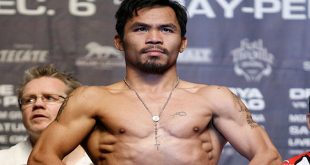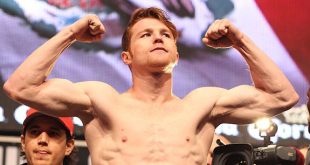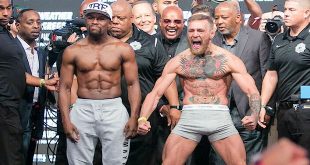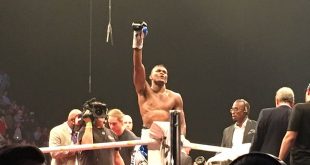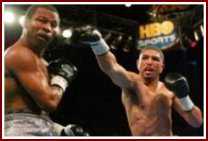 |
Those of you possessing a decidedly sweet tooth are hoping that “Sugar’ Shane Mosley can abolish his own estrangement with success and defeat Ronald “Winky’ Wright this Saturday. Meanwhile, the rest of you, enamored with the “Wright’ stuff see this |
impending clash unraveling to the contrary conclusion. Predict the result as you will, but be sure to recognize the fight as the one that decides the legitimate, undisputed light middleweight championship of the world. To fully understand why I emphasize the necessity to properly distinguish Wright-Mosley II, let us digress into recent history for a moment. When Lennox Lewis was the all-conquering force in heavyweight boxing deemed invincible, even he was susceptible to the manipulative chicanery of the sanctioning organizations. Lewis unified the undisputed heavyweight title, becoming the first fighter of British heritage to do so in one hundred years. The joyous accomplishment was accentuated by the knowledge that Lewis had even defied the machinations of Don King, boxing’s perennial purveyor of sharp practice. King’s grievous dismay must have been overwhelming as he watched control over the one title he had fought so voraciously to maintain, slip from his begrudging grasp. Whilst the boxing world marveled at the spectacle of Lewis’s final triumph against such great odds, a little man in a grey suit was preparing to whisk the IBF title from its decorative position upon Lewis’s shoulder before a fitting celebration could properly be conceived.
The plot for this vindictive thievery was probably hatched long before Lewis and Evander Holyfield reached the ring on that famous Las Vegas night in 1999. Its justification came in the form of a declaration, stating that Lewis had failed to compensate the IBF their mandatory fee for allowing the “privilege’ of their title to be associated with the fight; incidentally, a privilege exceeding the price-tag of $100.000 dollars is one that scarcely resembles a logical interpretation of the concept. Fortunately, the treacherous act was foiled by Lewis’s vast pockets and for a brief time, Lewis truly held the coveted prize in all its glory. However, the die was cast in no uncertain terms. A quickly assembled cast of undeserving contenders all vying for the chance at Lewis through their respective mandatory positions were disappointed at Lewis’s insistence on fighting the best available, and yes, even the most publicly requested opponents; the sheer effrontery of the man!
Eventually, Lewis’s decent stance could no longer be tolerated by boxing’s impatient greed-mongers, and to use the vernacular of a true capitalist like King, the “trickeration” commenced. The first to be stripped from Lewis’s possession was the WBA title, principally because Lewis refused to fight John Ruiz; a correct action when considering the embellishment of Lewis’s legacy, but one that denied us the opportunity to have rid of Ruiz perhaps once and for all at the hands of a legitimate champion. Herein lies the point of this unexpected history lesson. Upon conceding the WBA title, Lewis made requests to the organization that amounted to the creation of the “super champion’ status that is now wreaking havoc in situations such as that of Ronald Wright’s at this very time. The new legislation decreed that any fighter holding multiple world championships would be declared as the WBA super champion, a supposedly elevated rank conjured from thin air, thus freeing the “regular’ WBA title ready to be contested as a true world championship once again. Not wishing to be upstaged in the practice of such puerile nonsense, the WBC recently offered a peek of their rival superficiality in the case of Kostya Tszyu by declaring him a “champion emeritus.’
Obviously, Lewis’s requests were selfishly motivated. The continuation of these ludicrous concepts scream of impracticality, especially for those champions planning on that much more longevity. The advent of these titles has further distorted an already worryingly convoluted championship scenario, making the question of, “Who’s the champion?” that much more difficult to answer. The aforementioned drama was merely one instance in which fighters, who are undeniably the linchpin of their respective divisions, have endured severe financial loss to salvage their hold on a title belt. Perhaps actions such as these, from fighters at the high end of boxing’s pay structure are born out of sentimentality, an indulgence of pageantry more available than necessary. However, as long as those types of fighters will not forego the titles and whatever meaning they possess, we will remain very far from a time when sanctioning organizations will become irrelevant in the mainstream boxing consciousness and certainly in the manner of those pugilistic minnows struggling for survival.
Nonetheless, it is not a romanticism, but sheer common sense dictating to those of us believing that a fighter not beaten for his title in the ring never lost it and any fighter subsequently crowned with the title essentially stolen from him should be regarded as a paper champion until he meets his predecessor. Common sense you see is one of the only weapons we seem to have against the politics that consistently ridicule this sport. Travis Simms and Kassim Ouma, according to said politics, are world champions, but they should never be afforded true legitimacy until they have faced the winner of this weekend’s fight between Wright and Mosley.
My first experience of Wright was during his first tenure as a light middleweight champion as he spent a considerable spell defending the WBO version of it against rather hapless competition in England several years ago. Seeing such a gifted technical practitioner was a treat for real boxing enthusiasts, even if disappointed supporters of the aforementioned hapless opposition and thousands of boozed-up fans looking for quick knockouts disagreed. Wright’s smooth, southpaw styling mechanically broke down many fighters, and if he was displeasing to watch, his superb attributes made for even greater dissatisfaction if you happened to be on the end of them. A great fighter finds a way to win regardless of the odds stacked against him, and Wright possesses that which I term inevitability, an inner surety that accompanies his road to victory.
Many observers felt that Shane Mosley possessed that very quality. He does not. In fact, whatever Mosley still harbors from the ruin of his once devastating armory desperately needs to be resurrected on Saturday night. Famed trainer Joe Goossen was dubbed a miracle man earlier this year in allegedly transforming Diego Corrales into the monster that dispatched then unbeaten champion Acelino Freitas. In my opinion, Corrales was already a fighter ready to leave his all in the ring, a hunger perhaps diminished in Mosley’s gut due to the many millions he gathered from his fights with Oscar de la Hoya, and one that Goossen cannot instill. Conversely, you could scarcely see a more deserving champion than Wright, so shamefully avoided for large portions of his career and quite debatably done an injustice in the scoring of his fight with Fernando Vargas during the “Ferocious’ one’s precocious beginnings.
Wright is one of the nice guys, well thought of throughout the boxing world, but attention deficits do not allow nice to last long in boxing. Nice guys are allowed their shining moment of glory, but they had better have a secret weapon to satiate the appetite of the drama hungry fan or the nice personality and the technical, point-winning oriented style they possess quickly become instruments of boredom and before they know it, the deal is off and the channel is changed. Fighters with styles such as Wright and IBF heavyweight champion Chris Byrd pit themselves as Davids to the innumerable Goliaths abound in the boxing world. Byrd has taken steps to reconciling his niceties by slaying the giant instead of stepping around him; Wright can begin his transformation against Mosley. Industry stirrings seem to indicate that Mosley is approaching the twilight of his career, any truth to this means that his prime whistled by for one night only against De La Hoya back in 2000 and promptly deserted him.
Interpretations of the first Wright-Mosley encounter coupled with the mounting theory of Mosley’s impending career capitulation reveal that Mosley may suffer the first stoppage of his professional life in the prize ring this Saturday. That result would catapult Wright’s image from the gentleman boxer only esoterically appreciated to that of an entirely more marketable entity more than available to swap punches with the decidedly undecided De La Hoya or the decidedly destructive Felix Trinidad. Wright may currently be a David in Goliath country, but while the behemoths still roam the lands, the opportunity for Wright to rise and eclipse them all is certainly one to savor.
Jim Cawkwell can be reached at jam2lis@sprint.ca
 Boxing News Boxing News
Boxing News Boxing News

